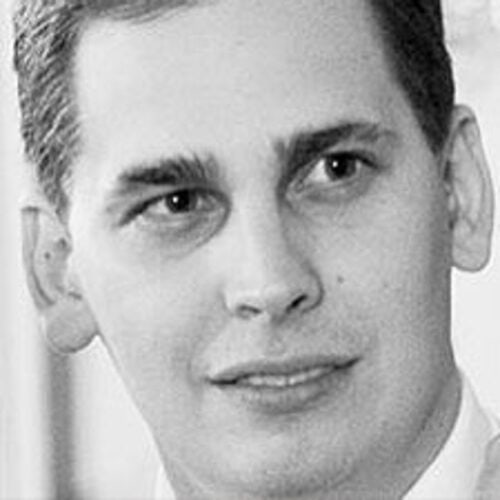
Keith Urbahn
2014 Lincoln Fellow
What is your current position?
President and Founding Partner, Javelin. Javelin is a literary, communications and digital agency in Alexandria, Virginia. Javelin works with authors, journalists, political figures, and organizations on book and television deals, website and app design and development, and public relations.
What encouraged you to transition from politics to founding a full-service communications firm?
It was entirely accidental. I was slated for a reserve deployment to Afghanistan, but it fell through two months beforehand. Until then, my plan was to deploy for a year and then go to business school and never return to Washington. I figured why not try starting up a business now, instead wasting two years trying to “learn” business—whatever that means. I saw a gap in how folks in Washington, conservatives in particular, told their stories; they loved acronyms and sterile bureaucratic cant, and they almost always lacked narrative, life, and yes, hipness. I wanted to bring a new energy to the way we conceived of things like books, op-eds, social media, to take some risks by using humor and emotion, and to marry communicating with the newest digital tools.
What are you currently working on?
On the literary side, we currently have 40 books in some stage of production that will be coming out in the next two years. For our public relations team, we’ve been quarterbacking media outreach for some 2016 presidential forums. And on digital, my favorite project at the moment is a mobile app we’ve developed and are launching with Donald Rumsfeld and the Churchill family. It’s hard to think of two better examples of statesmen in the past century than Rumsfeld and Winston Churchill. You can check out the app here.
How did you hear about the Claremont Institute?
Bringing it all full circle, it was working for Secretary Rumsfeld back in 2007, when he was awarded Claremont’s Statesmanship Award in honor of Churchill. I traveled with him to the event in Newport Beach and had the chance to meet members of the Claremont family for the first time. They must have made a mistake in the seating arrangements because this 23-year old kid was sitting between Charles Kesler and Sally Pipes.
What’s your fondest memory of the Claremont Institute?
It was at that 2007 dinner, meeting Andrew Breitbart. He was there in his full glory, a few years before he had become an internet sensation. He was kind, generous, and genuinely interested in what I thought was going on in the world and in Washington, though he had no reason to be. I don’t think I’d ever seen—or since seen—an ear-to-ear grin like the one I did on Andrew’s face when I introduced him to Mr. Rumsfeld and Andrew asked me to take a picture of the two of them.
There are all sorts of educational programs out there for current and rising conservative professionals. What do you think makes the Claremont Institute’s Fellowships unique?
There isn’t another program out there that rivals Claremont’s. And I’ve done a number of them. It starts with the quality of the thought. The meaning of our founding documents and the difference between statesmanship and leadership—an important distinction—is so deeply, so richly understood among Claremont scholars. The knowledge of political philosophy among those you interact with is almost second-nature and instinct. It’s an entirely different dimension of politics, one that you won’t get in Washington. There’s nothing superficial, or fake, or calculating about it.
If you could have a drink with an American Founder, or any great thinker, who would it be, why, and what would you order?
Easy. Sitting down with Alexander Hamilton and some cask-aged rum from his native St. Kitts. The sheer willpower it took for an orphan to rise to the commanding heights of a new nation is unbelievable. Jack Lew’s vendetta against him notwithstanding, Hamilton probably would get a kick out of learning that 200-plus years after his death, he’s by far the most culturally-hip Founding Father with a hit rap-musical on Broadway. Take that, Jefferson!
Who was more important for their time, George Washington or Abraham Lincoln? Why?
Lincoln. No other American then, before, or after could have preserved the Union. I really believe that. Had any other person inhabited the White House in 1861, we would have had a divided nation for decades, perhaps longer.
What do you think the current presidential candidates can learn from Lincoln?
The power of understatement and humility.
Do you have a favorite presidential candidate?
I’m backing Ted Cruz, and not just because I worked with him closely on his book, “A Time for Truth”. There isn’t anyone else in the field who has thought as deeply about constitutional principles as Ted. For anyone who believes we need a party standard-bearer and president who understands conservatism and the founding instead of just mouthing platitudes about them, it’s not a close call. It’s really not.
What books are you reading right now?
It just so happens that I’m right in the middle of two books connected to Claremont, or at least to Strauss. I’ve just started re-reading Harvey Mansfield’s “Manliness” and am about to finish Charles Kesler’s “I Am the Change”. The latter, I regret to say, is four years overdue on my part. These books are informing two major literary projects that should get a fair amount of media coverage in 2016. Stay tuned!

